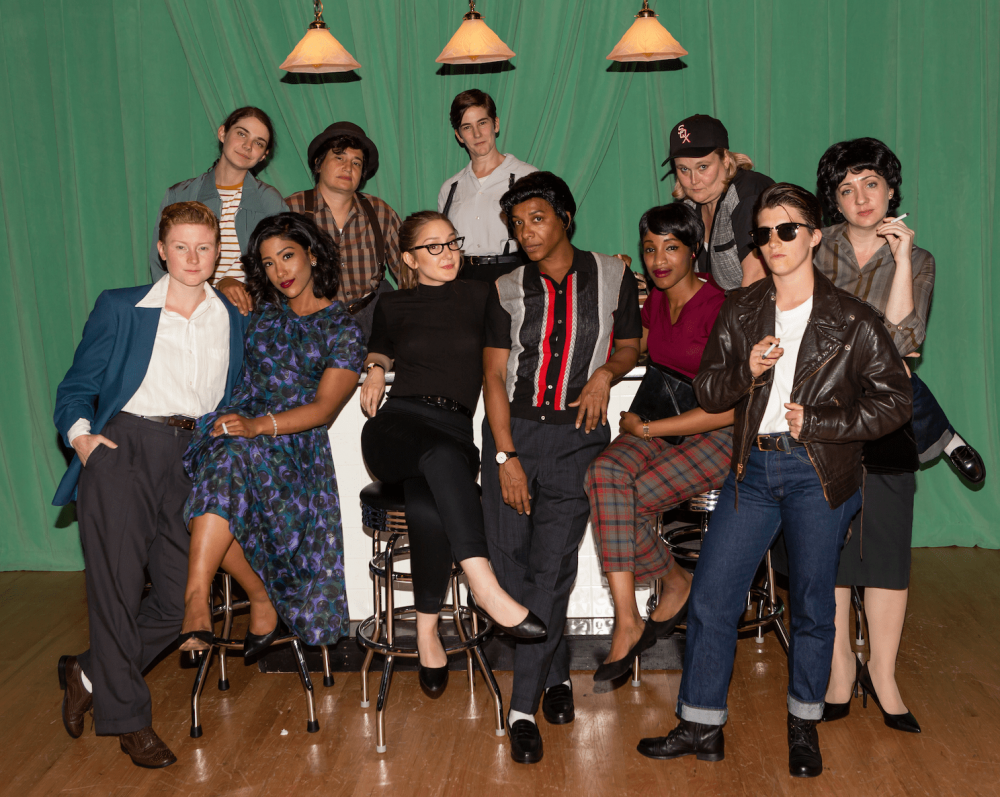A play by Merril Mushroom recreates lesbian life before Stonewall and reminds us of how far we’ve come.
Before you cringe at the “D” word, Bar Dykes, written by Merril Mushroom, is worthy of your time because it is a time machine that transports us to a time when lesbians lived in the shadows — and yet they lived! Hearts on their sleeves and cigarettes in hand, they held what little space they could — in local bars where they chronicled love and loss always underneath the constant threat of police persecution.
Bar Dykes is a great, lost lesbian play that embodies the uneasy dance between women-loving women, pre-Stonewall. This Pride, we just celebrated the 50th anniversary of the Stonewall Rebellion, so seeing Bar Dykes, never before staged in New York, was something of a treat, and a tribute to how far we’ve come.
Brought to life by a young and passionate cast, the marvel of this play is how it captures the toxic lesbian scene before there was any organized community. The play is well structured as one night in a quiet lesbian bar until the relationships between the female patrons —and a few newcomers — begin to unfold, explosively.
Cruising, courtship, love, lust, jealousy, and the threat of jail time. We watch the curious mating dance between butches and femmes, and there’s even the fascinating character of Cynthia, a gossipy and troublesome switch who describes herself as “KiKi” — a word which, unlike “dyke,” has been dropped from today’s lesbian lexicon.
Kudos to production company TOSOS for including three women of color in the cast. Although it would have been unlikely that in 1958 the patrons of this lesbian bar would have socialized across racial lines (most bars then were segregated), the revisionism is most welcome and absolutely one of the best things about this production.
In a special panel discussion after a preview of Bar Dykes it was interesting to hear how class was the main barrier to pre-Stonewall lesbians finding each other. Butches were targeted for impersonating men, while femmes often “passed” and thus were able to progress into white collar and middle or upper-middle-class jobs, while butches often became tethered to working class professions, and to certain behaviors that fueled drama.
If you’re in New York and you’d like to see some relevant, affordable, and worthwhile theatre, go see Bar Dykes. The setting puts you right in the lesbian bar in 1958 and the cast does a wonderful job of bringing to life our long-lost lesbian heritage, peopled by our “twilight sisters” who lived lives of high drama, coupledom and conflict — all before our rainbow revolution and the “LGBT” acronym, which seems so easy today, almost ubiquitous.
But watching Bar Dykes made me realize how far we’ve come. How far have we to go? A ways. It would be nice to have a lesbian scene and community free from toxicity, jealousy, competitiveness, and co-dependency that can plague our relationships. However, in Bar Dykes there are real moments of tenderness, care, and solidarity and we witness these qualities in lovely detailed moments a decade before a movement begins.
The entire cast and crew deserve praise. But I tip my KiKi hat to Moira Stone (Bo, the soft butch bartender who mans a tender bar); Kiebpoli Calnek (Linda, a swaggering black butch); and Kimberly Singh (Andy, a glamorous high femme). Applause also to Ben Philipp (The Marvelous Mrs. Maisel) for the costumes. And, of course, to Merril Mushroom for filling in some of the gaps in our history so that young queers know where we came from and continue to keep us out of the shadows.
About the production:
Merril Mushroom (Playwright) came out in the fifties as a bar dyke. Her writing has appeared over the years in a wide variety of anthologies and periodicals. Her stories about the fifties’ bar scene in Florida were first published in Common Lives/Lesbian Lives magazine, and she was a frequent contributor to early issues of Maize magazine. She lives on a rural Tennessee hill farm and is grateful for her gardens, friends, families. She is still the butch.
Virginia Baeta (Director) is an actor, singer, playwright, director, and (occasional) bass player. Her first play, Damaged Goods, was produced by TOSOS as part of the Emerging Artists Theatre Festival of New Work in 2017. Other than ongoing work with TOSOS, her most recent stage work has been with The Queen’s Company, an all-female classical theatre company, playing male characters from fops and fools to ill-fated kings.
Through her work with The Queen’s Company and TOSOS, she found inspiration to create theatrical experiences that challenge gender expectations and put strong female and queer characters on stage.
Mark Finley (Director) is the artistic director of TOSOS and has directed many of its acclaimed productions including Doric Wilson’s Street Theater. He made his Off-Broadway directorial debut with Chris Weikel’s Penny Penniworth.
TOSOS (The Other Side of Silence) is New York City’s oldest professional LGBTQ theater. In 1974, Off-Off Broadway veteran Doric Wilson (1939-2011), cabaret star Billy Blackwell and director Peter dell Valle, started the first professional gay theatre company in NYC. It was called The Other Side of Silence; TOSOS for short. The company has produced over 30 mainstage shows and so many readings of new plays and works in progress we have trouble counting them all.
